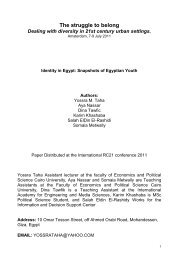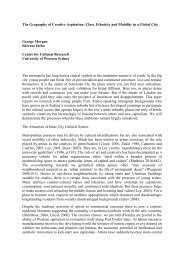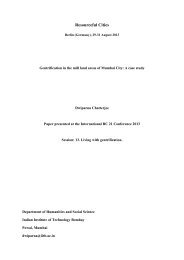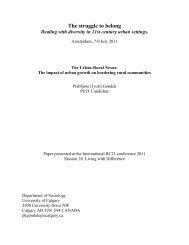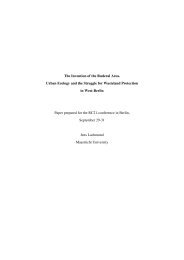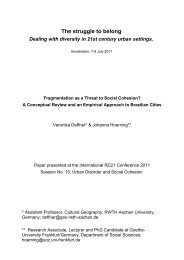The hidden side of metropolization. Governing squats and slums in ...
The hidden side of metropolization. Governing squats and slums in ...
The hidden side of metropolization. Governing squats and slums in ...
You also want an ePaper? Increase the reach of your titles
YUMPU automatically turns print PDFs into web optimized ePapers that Google loves.
2<br />
Abstract<br />
More than one billion people <strong>in</strong> the world could be con<strong>side</strong>red as “squatters”. Literature usually<br />
focuses on unruly places like <strong>slums</strong> <strong>in</strong> the suburbs <strong>of</strong> the global cities <strong>in</strong> the South <strong>and</strong> <strong>in</strong> exponential<br />
<strong>and</strong> uncontrolled grow<strong>in</strong>g metropolitan areas <strong>in</strong> emerg<strong>in</strong>g countries. Yet, there are many illegal<br />
settlements persist<strong>in</strong>g at the doors <strong>of</strong> European cities <strong>in</strong> different forms, namely, <strong>squats</strong> <strong>in</strong> build<strong>in</strong>gs<br />
or illegal occupations <strong>of</strong> l<strong>and</strong>. I propose here to address these two k<strong>in</strong>ds <strong>of</strong> occupations. In this paper,<br />
we con<strong>side</strong>r the case <strong>of</strong> Paris at the metropolitan scale. Squats <strong>and</strong> <strong>slums</strong> are both illegal occupations<br />
<strong>of</strong> space <strong>in</strong> order to get a house <strong>and</strong> a place to live or survive. <strong>The</strong> paper addresses the features <strong>of</strong> the<br />
public policies implemented towards urban spaces’ illegal occupations. Three dimensions could be<br />
underl<strong>in</strong>ed concern<strong>in</strong>g the government <strong>of</strong> <strong>squats</strong> <strong>and</strong> <strong>slums</strong>: the hous<strong>in</strong>g problem, the<br />
<strong>metropolization</strong> governance <strong>and</strong> the question <strong>of</strong> ungovernability <strong>of</strong> urban societies.<br />
This paper only con<strong>side</strong>rs the illegal occupation <strong>of</strong> urban spaces as a departure po<strong>in</strong>t for an analysis<br />
<strong>of</strong> policy implementation. I assume that the study <strong>of</strong> <strong>squats</strong> <strong>and</strong> <strong>slums</strong> enables us to demonstrate that<br />
urban authorities are able to implement public policies towards these illegal settlements even if these<br />
occupations seem, by def<strong>in</strong>ition, ungovernable. I try to characterize these urban policies <strong>and</strong> I<br />
address three ma<strong>in</strong> features. Firstly, I con<strong>side</strong>r <strong>squats</strong> <strong>and</strong> <strong>slums</strong> as challenges to urban policies.<br />
Secondly, <strong>squats</strong> <strong>and</strong> <strong>slums</strong> become public problems which are put on the local agenda <strong>and</strong> are<br />
targets <strong>of</strong> public policies. Thirdly, I exam<strong>in</strong>e the policy <strong>in</strong>struments used by local actors <strong>in</strong> order to<br />
control illegal occupations <strong>in</strong> the Ile-de-France Region.




